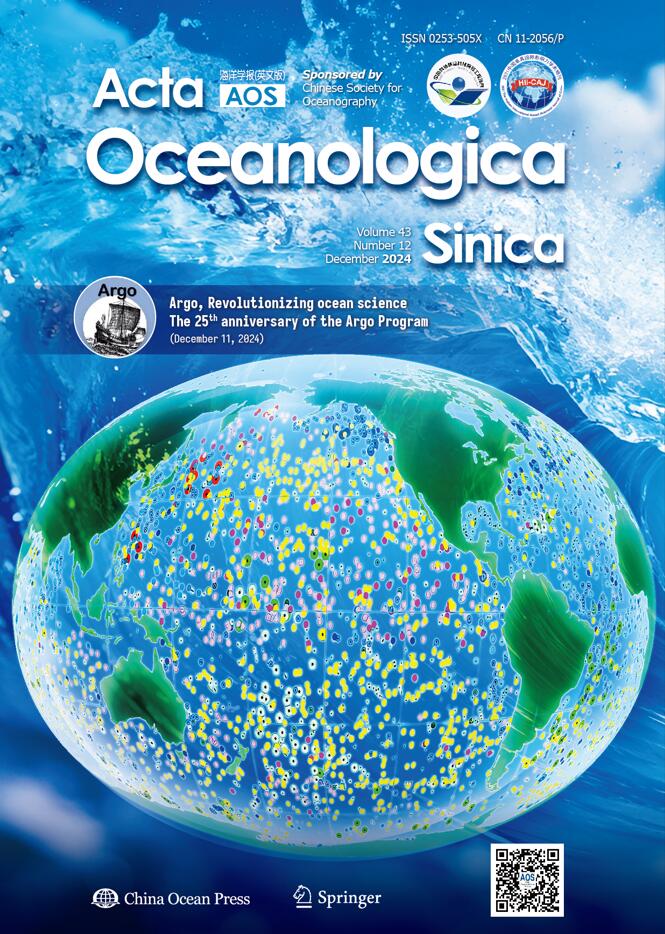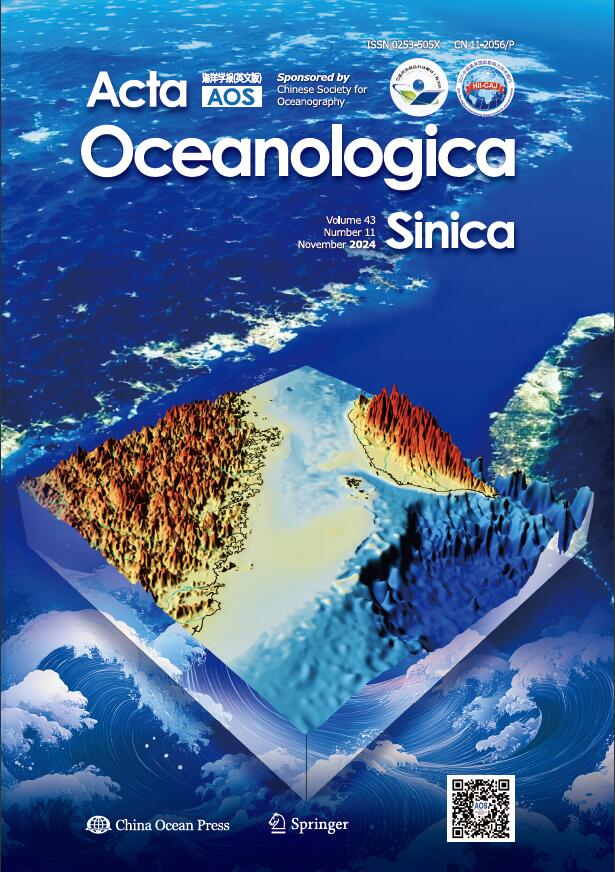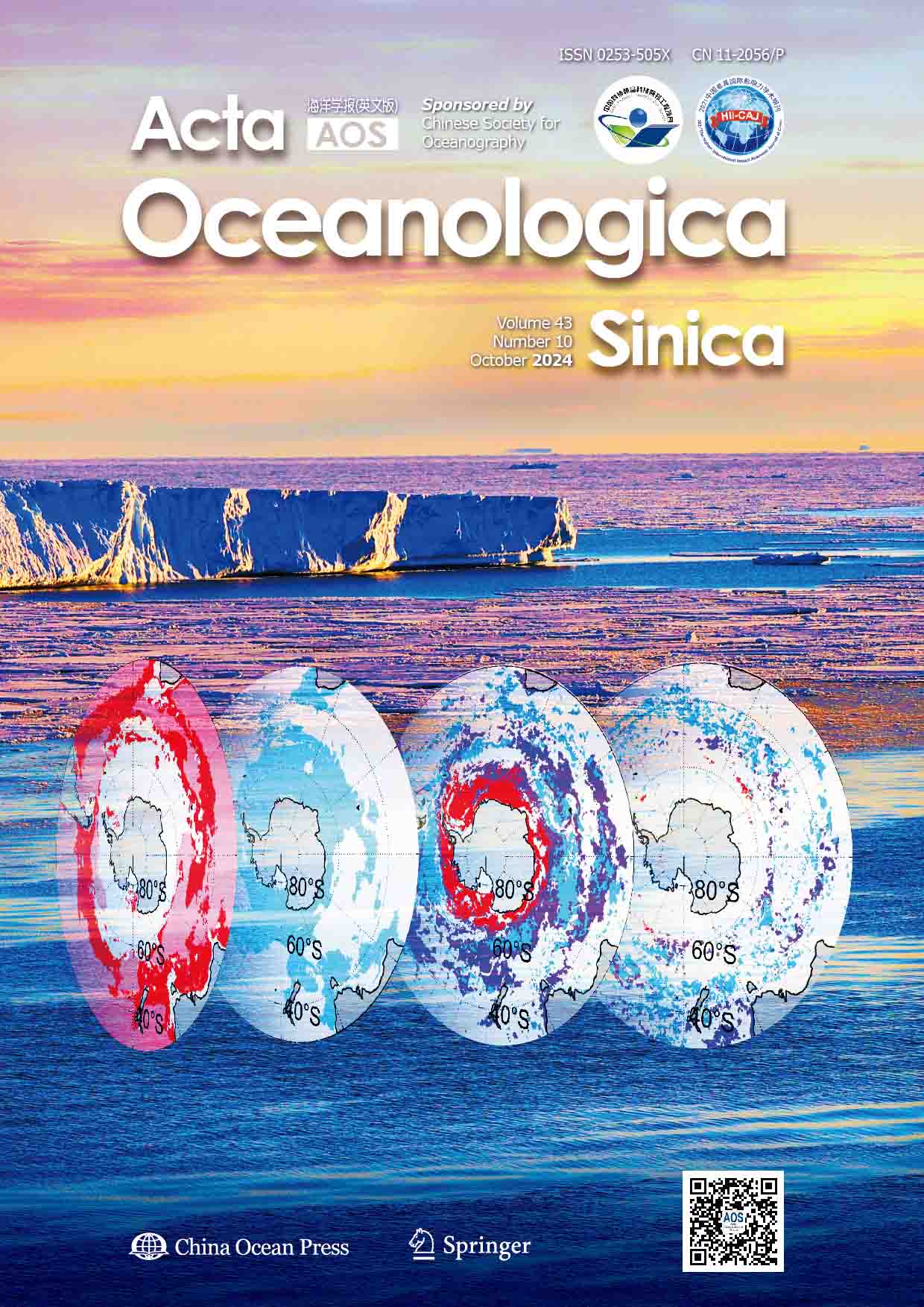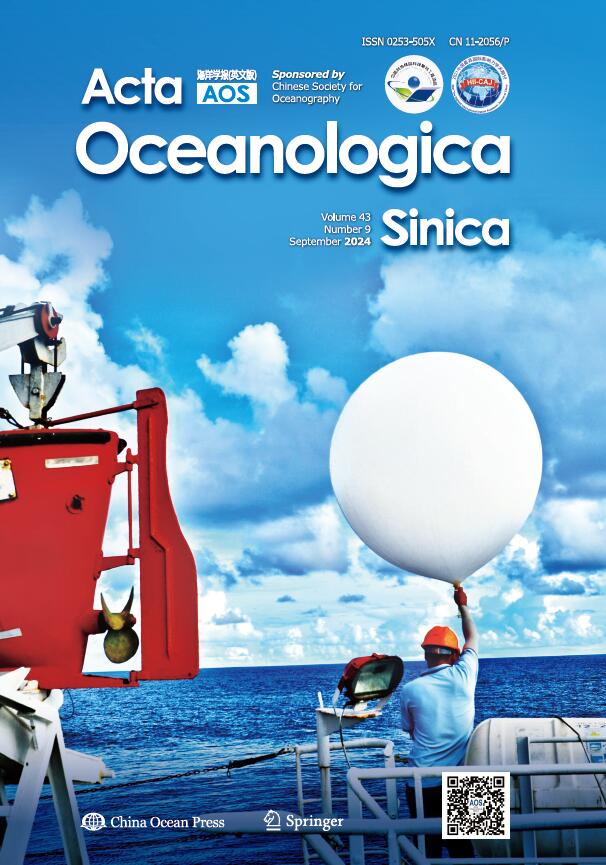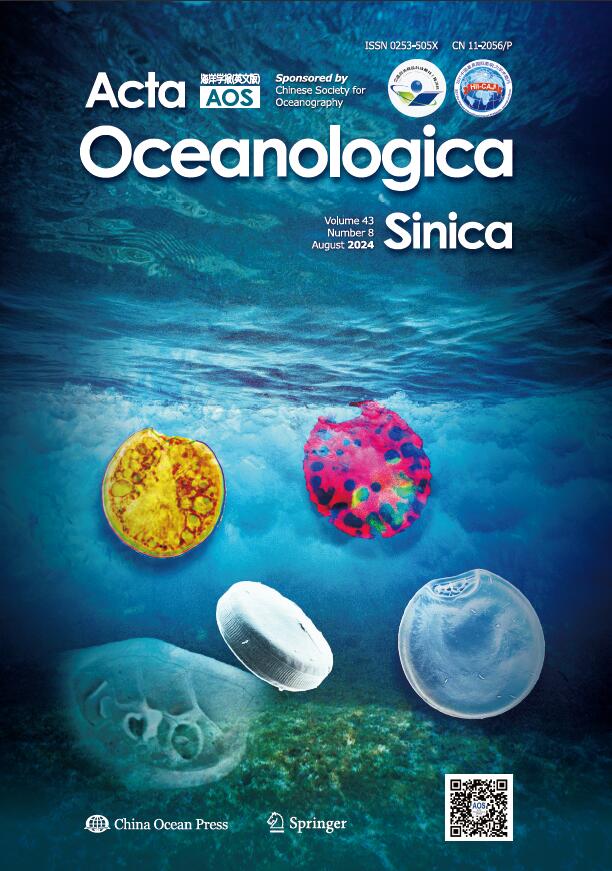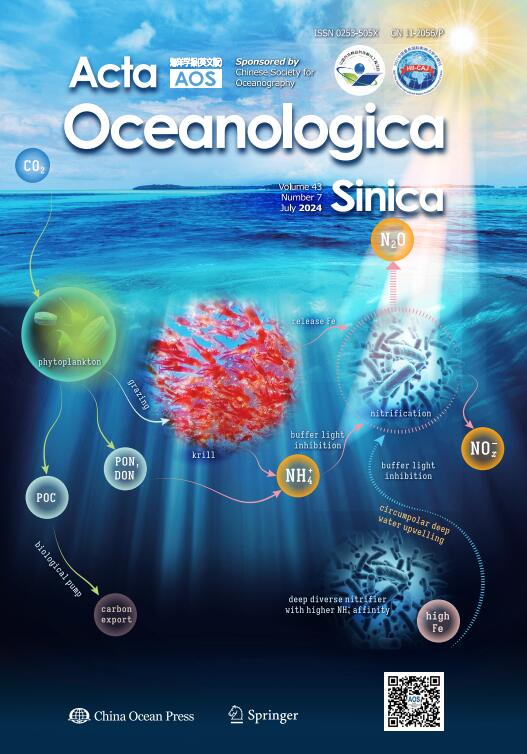1993 Vol. 12, No. 4
Display Method:
1993, (4): 475-486.
Abstract:
To investigate the nonlinear properties of wind waves, experiments are carried out in a wind-wave flume with slope bottom at different wind speeds and fetches.Both the internal structure and apparent features of the nonlin-earity of wind waves are studied by using bispectral and statistical analysis of surface elevations.The relations between bispectra and nonlinear apparent characteristics of wind waves are established and confirmed.
To investigate the nonlinear properties of wind waves, experiments are carried out in a wind-wave flume with slope bottom at different wind speeds and fetches.Both the internal structure and apparent features of the nonlin-earity of wind waves are studied by using bispectral and statistical analysis of surface elevations.The relations between bispectra and nonlinear apparent characteristics of wind waves are established and confirmed.
1993, (4): 487-498.
Abstract:
On the basis of time series measurements of winds, currents, temperature and salinity from equatorial current meter mooring and acoustic Doppler current profiler during the PRC/USA joint air-sea interaction studies in the western tropical Pacifc Ocean and sea level data provided by Prof.Wyrtki, analyses are made of the physical process and mechanism for the exceptionally inverse phenomenon (westward) of the Equatorial Undercurrent (EUC) in the western tropical Pacific after entering the mature stage of 1986/1987 ENSO event, and the numerical simulation is also conducted by "cross section" model.The results indicate that the inversion of the EUC is related to that of pressure gradient force near the equator under the influence of non-local permanent westerlies.
On the basis of time series measurements of winds, currents, temperature and salinity from equatorial current meter mooring and acoustic Doppler current profiler during the PRC/USA joint air-sea interaction studies in the western tropical Pacifc Ocean and sea level data provided by Prof.Wyrtki, analyses are made of the physical process and mechanism for the exceptionally inverse phenomenon (westward) of the Equatorial Undercurrent (EUC) in the western tropical Pacific after entering the mature stage of 1986/1987 ENSO event, and the numerical simulation is also conducted by "cross section" model.The results indicate that the inversion of the EUC is related to that of pressure gradient force near the equator under the influence of non-local permanent westerlies.
1993, (4): 511-520.
Abstract:
In the paper, the sea is divided into two layers with density jumping, assuming that the physical parameters in each layer are independent of depth.Two-layer flow field with tide and wind currents is calculated with extended ADI method, after the calculation for flow field is stable, coupled with temperature diffusion equations and thermohaline depth prediction equation, a four-day time prediction of the surface, bottom temperature and thermohaline depth of the Huanghai and the Bohai Seas.At the same time, three dimensional temperature field of sea water is predicted through vertical temperature distribution function.The result indicates that the prediction quality of the whole model and the fitting degree between the predicted result and the measured values are satisfactory.
In the paper, the sea is divided into two layers with density jumping, assuming that the physical parameters in each layer are independent of depth.Two-layer flow field with tide and wind currents is calculated with extended ADI method, after the calculation for flow field is stable, coupled with temperature diffusion equations and thermohaline depth prediction equation, a four-day time prediction of the surface, bottom temperature and thermohaline depth of the Huanghai and the Bohai Seas.At the same time, three dimensional temperature field of sea water is predicted through vertical temperature distribution function.The result indicates that the prediction quality of the whole model and the fitting degree between the predicted result and the measured values are satisfactory.
1993, (4): 521-534.
Abstract:
Under bilateral cooperation between the United States of America and the People's Republic of China, a series of research cruises were conducted over the western Pacific Ocean.It was found that a) the non-sea-salt sulfate aerosol particles are the major source of cloud condensation nuclei, b) the population of clouds and the total albedo are proportional to the concentration of condensation nuclei and consequently to the concentration of the non-sea-salt aerosol particles, and c) the amount of rainfall is inversely proportional to the concentration of non-sea-salt sulfate aerosol particles.It seems that anthropogenic sulfate aerosol particles affect the regional planetary albedo and climate and that the contribution from biogenically derived sulfate aerosol particles is of lesser importance.
Under bilateral cooperation between the United States of America and the People's Republic of China, a series of research cruises were conducted over the western Pacific Ocean.It was found that a) the non-sea-salt sulfate aerosol particles are the major source of cloud condensation nuclei, b) the population of clouds and the total albedo are proportional to the concentration of condensation nuclei and consequently to the concentration of the non-sea-salt aerosol particles, and c) the amount of rainfall is inversely proportional to the concentration of non-sea-salt sulfate aerosol particles.It seems that anthropogenic sulfate aerosol particles affect the regional planetary albedo and climate and that the contribution from biogenically derived sulfate aerosol particles is of lesser importance.
1993, (4): 535-547.
Abstract:
A modified and improved primitive equation numerical model with p-sigma incorporated vertical coordinates is used to simulate the effects of different sea surface temperature distributions over the western Pacific on the summer monsoon properties.The different sea surface temperature (SST) distributions are automatically generated in the time integrations by using two different SST models, one of which is called the deep ocean model (DOM) and the other the shallow ocean model (SOM).The SST generated by the DOM has the distribution pattern of the initial SST which is similar to the pattern in the cold water years over the western Pacific, while the SST generated by the SOM has the pattern similar to that in the warm water years.The differences between the experimental results by using DOM and SOM are analyzed in detail.
A modified and improved primitive equation numerical model with p-sigma incorporated vertical coordinates is used to simulate the effects of different sea surface temperature distributions over the western Pacific on the summer monsoon properties.The different sea surface temperature (SST) distributions are automatically generated in the time integrations by using two different SST models, one of which is called the deep ocean model (DOM) and the other the shallow ocean model (SOM).The SST generated by the DOM has the distribution pattern of the initial SST which is similar to the pattern in the cold water years over the western Pacific, while the SST generated by the SOM has the pattern similar to that in the warm water years.The differences between the experimental results by using DOM and SOM are analyzed in detail.
1993, (4): 549-561.
Abstract:
The characteristic low-frequency oscillation of the sea surface temperature anomaly (SSTA) of ENSO related regions, Niño 1+2, Niño 3, Niño 4 and Niño West, and the Southern Oscillation index (SOI) is analyzed with the method of maximum entropy spectrum.Antarctic sea ice is divided into 4 regions, i.e.East Antarctic is Region Ⅰ (0°-120°E), the region dominated by Ross Sea ice is Region Ⅱ (120°E-120°W), the region dominated by Ross Sea ice is Region Ⅲ (120°W-0°), and the whole Antarctic sea ice area is Region Ⅳ.Also, the month-to-month correlation series of the sea ice with ENSO from contemporary to 5-years lag is calculated.The optimum correlation period is selected from the series.The characteristics and the rules obtained are as follows.1.There are a common 4-years main period of the SSTA of Niños 1+2, 3 and 4, a rather strong 4-years secondary period and a quasi-8-years main period of that of Niño West.
The characteristic low-frequency oscillation of the sea surface temperature anomaly (SSTA) of ENSO related regions, Niño 1+2, Niño 3, Niño 4 and Niño West, and the Southern Oscillation index (SOI) is analyzed with the method of maximum entropy spectrum.Antarctic sea ice is divided into 4 regions, i.e.East Antarctic is Region Ⅰ (0°-120°E), the region dominated by Ross Sea ice is Region Ⅱ (120°E-120°W), the region dominated by Ross Sea ice is Region Ⅲ (120°W-0°), and the whole Antarctic sea ice area is Region Ⅳ.Also, the month-to-month correlation series of the sea ice with ENSO from contemporary to 5-years lag is calculated.The optimum correlation period is selected from the series.The characteristics and the rules obtained are as follows.
1993, (4): 499-510.
Abstract:
In this paper, without recourse to the nonlinear dynamical equations of the waves, the nonlinear random waves are retrieved from the non-Gaussian characteristic of the sea surface elevation distribution.The question of coincidence of the nonlinear wave profile, spectrum and its distributions of maximum (or minimum) values of the sea surface elevation with results derived from some existing nonlinear theories is expounded under the narrow-band spectrum condition.Taking the shoaling sea wave as an example, the nonlinear random wave process and its spectrum in shallow water are retrieved from both the non-Gaussian characteristics of the sea surface elevation distribution in shallow water and the normal sea waves in deep water and compared with the values actually measured.Results show that they can coincide with the actually measured values quite well, thus, this can confirm that the method proposed in this paper is feasible.
In this paper, without recourse to the nonlinear dynamical equations of the waves, the nonlinear random waves are retrieved from the non-Gaussian characteristic of the sea surface elevation distribution.The question of coincidence of the nonlinear wave profile, spectrum and its distributions of maximum (or minimum) values of the sea surface elevation with results derived from some existing nonlinear theories is expounded under the narrow-band spectrum condition.Taking the shoaling sea wave as an example, the nonlinear random wave process and its spectrum in shallow water are retrieved from both the non-Gaussian characteristics of the sea surface elevation distribution in shallow water and the normal sea waves in deep water and compared with the values actually measured.Results show that they can coincide with the actually measured values quite well, thus, this can confirm that the method proposed in this paper is feasible.
1993, (4): 563-572.
Abstract:
By using iterative method to solve the vector radiative transfer equation of discrete scatterers with randomly rough under-boundary, the back-scattering coefficient is derived, and is applied to the two-scale model of sea surface with foam scatterers driven by strong wind.By employing the modified probability density function of Cox and Munk's, and Pierson's sea spectrum, numerical results of polarized back-scattering are calculated.The functional dependence on wind speed and direction, observation angle, polarization and other parameters are discussed, and theoretical results are favorably matched with experimental data.
By using iterative method to solve the vector radiative transfer equation of discrete scatterers with randomly rough under-boundary, the back-scattering coefficient is derived, and is applied to the two-scale model of sea surface with foam scatterers driven by strong wind.By employing the modified probability density function of Cox and Munk's, and Pierson's sea spectrum, numerical results of polarized back-scattering are calculated.The functional dependence on wind speed and direction, observation angle, polarization and other parameters are discussed, and theoretical results are favorably matched with experimental data.
1993, (4): 573-584.
Abstract:
On the basis of the data obtained from the investigations on some rivers in China and Australia, the author discusses the spatial and temporal changes of various portions of fluvial-estuarine system during postglacial sea-level rising in present coastal and deltaic areas.The evolution of a fluvial-estuarine system can be divided into four development stages:early transgression, late transgression, stationary and regression.Early transgression brought about filling-in of the paleo-valley formed in low stand of sea level.In response to late transgression the estuaries were created, during the stationary stage the big swamp was developed.The regression led to estuaries to be filled with sediments and then became deltas.At the same locality the fluvial-estuarine system changed with time.In the transgressive period the lower reach of a river changed into an estuary, and then became nearshore area.In the regressive period the nearshore area changed into an estuary, and then became delta.
On the basis of the data obtained from the investigations on some rivers in China and Australia, the author discusses the spatial and temporal changes of various portions of fluvial-estuarine system during postglacial sea-level rising in present coastal and deltaic areas.The evolution of a fluvial-estuarine system can be divided into four development stages:early transgression, late transgression, stationary and regression.Early transgression brought about filling-in of the paleo-valley formed in low stand of sea level.In response to late transgression the estuaries were created, during the stationary stage the big swamp was developed.The regression led to estuaries to be filled with sediments and then became deltas.At the same locality the fluvial-estuarine system changed with time.In the transgressive period the lower reach of a river changed into an estuary, and then became nearshore area.In the regressive period the nearshore area changed into an estuary, and then became delta.
1993, (4): 605-615.
Abstract:
The sedimentary sequence of the upper 4 m deposits in the Huanghe Harbour Pit is as follows, 1, Distributary mouth bar deposits formed before 1964; 2.lower delta plain (tidal flat) and subaqueous delta lateral deposits formed in the period of 1964-1972; 3.deposits of crevasse splay and distributary channel near mouth, formed in the period of 1972-1974; 4.tidal flat deposits formed in the period of 1975-1984.The sequence shows superimposition of sedimentary environments parallel to coastline.
The sedimentary sequence of the upper 4 m deposits in the Huanghe Harbour Pit is as follows, 1, Distributary mouth bar deposits formed before 1964; 2.lower delta plain (tidal flat) and subaqueous delta lateral deposits formed in the period of 1964-1972; 3.deposits of crevasse splay and distributary channel near mouth, formed in the period of 1972-1974; 4.tidal flat deposits formed in the period of 1975-1984.The sequence shows superimposition of sedimentary environments parallel to coastline.
1993, (4): 617-627.
Abstract:
The sedimentary sequences since the Late Pleistocene can be divided into Layers E, D, C, B, A from old to young according to systematic analysis of grain-size, pollen and spore, diatom, foraminifera, radiocarbon dating and paleogeomagnetism of 16 sedimentary cores from the sea area of the western Taiwan Strait.The results proved the existences of the Langqi transgression (upper section of Layer D) formed in middle and late stages of early Würm glacial period, Fuzhou transgression (Layer C) formed in Würm sub-interglacial period and Changle transgression (Layer A) formed in postglacial period.It was also the first time to discover the Jinmen transgression (Layer E) formed in Riss-Würm interglacial period.In this paper it is proposed that most part of the Taiwan Strait emerged as land in the early stage of early Würm glacial period, and was still under sublittoral environment in late Würm glacial period, as well as the existence of Dongshan Continental Bridge was in 8×103 a BP.
The sedimentary sequences since the Late Pleistocene can be divided into Layers E, D, C, B, A from old to young according to systematic analysis of grain-size, pollen and spore, diatom, foraminifera, radiocarbon dating and paleogeomagnetism of 16 sedimentary cores from the sea area of the western Taiwan Strait.The results proved the existences of the Langqi transgression (upper section of Layer D) formed in middle and late stages of early Würm glacial period, Fuzhou transgression (Layer C) formed in Würm sub-interglacial period and Changle transgression (Layer A) formed in postglacial period.It was also the first time to discover the Jinmen transgression (Layer E) formed in Riss-Würm interglacial period.In this paper it is proposed that most part of the Taiwan Strait emerged as land in the early stage of early Würm glacial period, and was still under sublittoral environment in late Würm glacial period, as well as the existence of Dongshan Continental Bridge was in 8×103 a BP.
1993, (4): 585-595.
Abstract:
One hundred and seven marine aerosol samples were collected during December 1988 to March 1990, and 3 dry deposition samples, 16 rain samples and 2 Cascade Impacter samples were collected from March to May 1990 at the southeast coast of the Xiamen Island.All the samples were analyzed for SO42-, NO3-, Cl-, Na+, NH4+, using ion chromatography.
The results indicate that the concentration of sulfate in marine aerosols over the Xiamen waters appears to be of seasonal variation, in an order of winter > spring > autumn > summer.The mean sulfate concentration lor the total marine aerosol samples over the Xiamen waters is 9.37 μg/m3, respectively 0.89 and 8.48 μg/m3 for the seasalt and non-sea-salt sulfate.The distribution of sulfate shows a bimodal form with a peak in the coarse particle range which is derived from the sea-salt sulfate, and a peak in the fine particle range which is derived from the non-sea-salt sulfate.The total deposition of sulfate to the Xiamen waters is estimated to be 4.68g/m2·a, with dry and wet depositions being approximately 2.19g/m2·a respectively.
One hundred and seven marine aerosol samples were collected during December 1988 to March 1990, and 3 dry deposition samples, 16 rain samples and 2 Cascade Impacter samples were collected from March to May 1990 at the southeast coast of the Xiamen Island.All the samples were analyzed for SO42-, NO3-, Cl-, Na+, NH4+, using ion chromatography.
The results indicate that the concentration of sulfate in marine aerosols over the Xiamen waters appears to be of seasonal variation, in an order of winter > spring > autumn > summer.The mean sulfate concentration lor the total marine aerosol samples over the Xiamen waters is 9.37 μg/m3, respectively 0.89 and 8.48 μg/m3 for the seasalt and non-sea-salt sulfate.The distribution of sulfate shows a bimodal form with a peak in the coarse particle range which is derived from the sea-salt sulfate, and a peak in the fine particle range which is derived from the non-sea-salt sulfate.The total deposition of sulfate to the Xiamen waters is estimated to be 4.68g/m2·a, with dry and wet depositions being approximately 2.19g/m2·a respectively.
1993, (4): 597-603.
Abstract:
Some of the results about vertical profile of heavy metals of seawater to the south of Japan in Oct.1990 are presented and discussed in relation to the concentration of dissolved Cu, Cd and Ni to biogeochemical environments.It points out that the distribution of dissolved Cu is higher in surface water than that in/upper 500 m layer, and maxima value attains the 8.2 n mol/dm3 in depth of 4 000 m.The concentrations of dissolved Ni ranges from 3.4 n mol/dm3 in surface seawater to 8.5 n mol/dm3 in the deep to the south of Japan.The highest values are observed in the colder waters.This paper shows also that the vertical profile of dissolved Cd is perfect nutrient-type distribution.And dissolved Cd and Phosphate are linearly correlated by the regression equation.The △Cd:△N:△P atomic ratio is 3.5×10-4:14:1.
Some of the results about vertical profile of heavy metals of seawater to the south of Japan in Oct.1990 are presented and discussed in relation to the concentration of dissolved Cu, Cd and Ni to biogeochemical environments.It points out that the distribution of dissolved Cu is higher in surface water than that in/upper 500 m layer, and maxima value attains the 8.2 n mol/dm3 in depth of 4 000 m.The concentrations of dissolved Ni ranges from 3.4 n mol/dm3 in surface seawater to 8.5 n mol/dm3 in the deep to the south of Japan.The highest values are observed in the colder waters.This paper shows also that the vertical profile of dissolved Cd is perfect nutrient-type distribution.And dissolved Cd and Phosphate are linearly correlated by the regression equation.The △Cd:△N:△P atomic ratio is 3.5×10-4:14:1.
1993, (4): 629-635.
Abstract:



